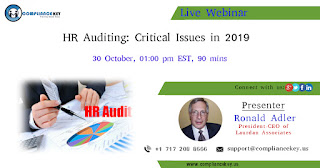Compliance Key INC - HR Webinar in United States
717-208-8666
Overview
Numerous
external forces and factors have an impact on the purpose, scope, and
demand for HR audits. First, in the global economy, human capital has
become for many organizations the single most important determinant of
competitiveness, productivity, sustainability, and profitability.
Increasingly, the organization's human capital is the source of
innovation and a driver of business success.
Second, a confluence of economic, political, and social factors, including stockholder, plaintiffs, and third party initiatives, have resulted in increased statutory and regulatory requirements, the call for greater transparency, and increased internal and external audit activity.
Third, governmental agencies have become more active - some would argue more aggressive - and have committed increasing resources to conducting assessments of employment policies and practices. Importantly, the EEOC, the OFCCP, U.S. DOL, and ICE have advised employers that they consider self- assessments and audits as a "best practice."
Second, a confluence of economic, political, and social factors, including stockholder, plaintiffs, and third party initiatives, have resulted in increased statutory and regulatory requirements, the call for greater transparency, and increased internal and external audit activity.
Third, governmental agencies have become more active - some would argue more aggressive - and have committed increasing resources to conducting assessments of employment policies and practices. Importantly, the EEOC, the OFCCP, U.S. DOL, and ICE have advised employers that they consider self- assessments and audits as a "best practice."
Why should you attend this webinar?
As
human resources has taken on new importance in a growing number of
organizations, senior management, internal auditors, and human resources
staff increasingly recognize the value and importance of sound human
resource management. This critical analysis requires an understanding
of how the human resources currently affects the organization; what
legal and process risks expose the organization to liabilities; and how
effective HR management can improve the organization's business,
operational, and financial well-being.
Thus HR audits are now seen as a critical management tool, helps the organization assess the value of the organization's human capital, helps the organization identify and assess human capital risks and opportunities, and helps the organization ensure the proper and effective allocation of resources.
How effective is your organization's human resource management? Is your human capital helping you achieve organizational objectives? Are your employment practices creating material risks and liabilities? This session discusses the development and use of HR Audits in answering these questions and addressing critical risk management and due diligence issues.
Thus HR audits are now seen as a critical management tool, helps the organization assess the value of the organization's human capital, helps the organization identify and assess human capital risks and opportunities, and helps the organization ensure the proper and effective allocation of resources.
How effective is your organization's human resource management? Is your human capital helping you achieve organizational objectives? Are your employment practices creating material risks and liabilities? This session discusses the development and use of HR Audits in answering these questions and addressing critical risk management and due diligence issues.
Areas Covered in the Session:
- 2018 - 2019 current trends in HR Auditing
- Critical components of an HR audit
- Economic, political, regulatory, and social factors affecting HR audits
- An update on HR audit methodology and the use of HR auditing tools
- The development of the HR Audit Scorecard
Who can Benefit:
- HR professionals
- CFOs, CROs, COOs
- Internal auditors/external auditors
- Risk managers
- Operations managers
Compliance Key INC
https://www.compliancekey.us/cross-industry-functions 717-208-8666

Comments
Post a Comment